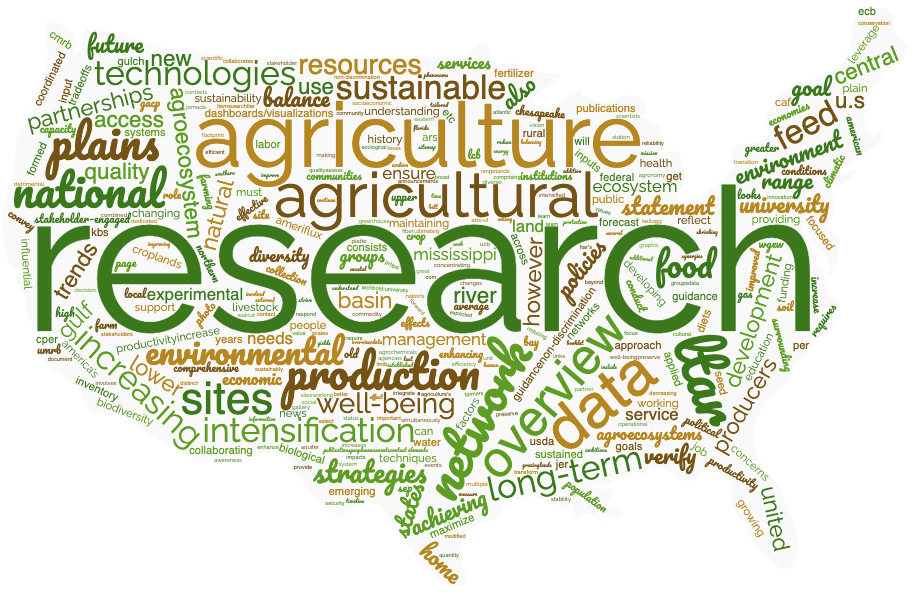Network Overview
Overview of the research focus of the LTAR NetworkVision
Food for the future: Understanding and enhancing the sustainability of agriculture
Mission
A network developing national strategies for the sustainable intensification of agriculture production
What is the LTAR Network?
The Long-Term Agroecosystem Research (LTAR) network is a growing research network comprising 19 established, long-term research sites focused on developing national strategies for more efficient agricultural production while improving the quality of the environment and the well-being of America’s farming communities.
What is the Sustainable Intensification of Agriculture?
Agricultural intensification involves increasing production while maintaining or decreasing the use of system resources (labor, feed, fertilizer, land, etc.). However, sustainable intensification also needs to balance increased production with the conservation of natural resources, protection of the environment, and enhancing rural well-being.
Sustainable intensification will increase our food security while shrinking the environmental footprint of agriculture. These strategies strive to maximize yields while simultaneously reducing detrimental environmental impacts. However, they must also be tailored to distinct climatic, ecological, political, and socioeconomic contexts.
- Improved Agricultural Productivity
Increase production per unit of input such as labor, time, land, water, fertilizer, agrochemicals, seed, or feed. - Rural Well-Being
Preserve cultural value, reduce reliability on external inputs, improve economic stability and resilience, and convey the social and environmental values of rangelands, grazinglands and croplands. - Preserve Natural Resources
Assess the synergies and tradeoffs among ecosystem services, such as soil health, biodiversity, and water quality and quantity, to provide producers and agencies with important information and new techniques for management and economic decision making.
What is Our Approach?
Agriculture in the United States must respond to increasing needs for productivity and efficiency, while balancing the needs to preserve our natural resources and ensure well-being of the nation’s farmers and producers. Increasing population and changing diets, combined with a greater awareness of agriculture’s role in providing and maintaining land use beyond food, feed, fiber, and energy production, require a comprehensive understanding on where and how U.S. agriculture can be intensified sustainably.
Achieving these goals requires strategies that reflect the diversity of U.S. agroecosystems and can be applied at multiple scales and under diverse conditions.

The LTAR network collaborates with several partner institutions and looks forward to collaborating with other scientific institutions and networks in the future. In addition, the LTAR network has and will continue to leverage additional funding from stakeholders and commodity groups to enhance research.
Our approach to achieving our goals include: coordinated research between sites, collection and management of long-term data, development of new management techniques and technologies, and the development of agricultural innovation partnerships.
Ultimately, a balance of local and national concerns is expected to support effective strategies for sustainable intensification that reflect the broad diversity and national ambitions of the United States.
ABOUT LTAR
The USDA Agricultural Research Service (ARS) Long-Term Agroecosystem Research network consists of 18 Federal and university agricultural research sites with an average of over 50 years of history. The goal of this research network is to ensure sustained crop and livestock production and ecosystem services from agroecosystems, and to forecast and verify the effects of environmental trends, public policies, and emerging technologies.


